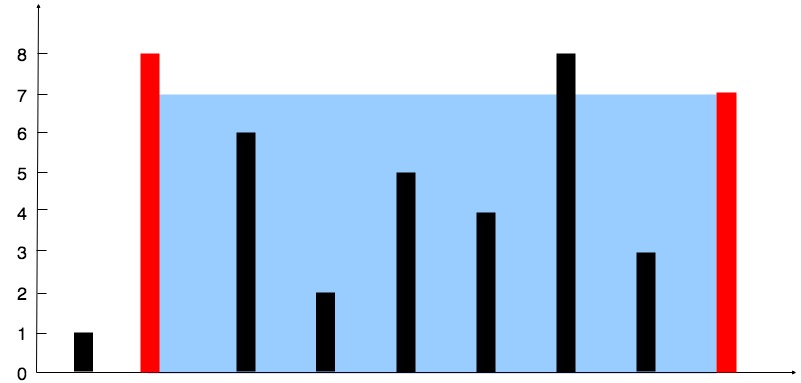LeetCode-in-All
11. Container With Most Water
Medium
Given n non-negative integers a1, a2, ..., an , where each represents a point at coordinate (i, ai). n vertical lines are drawn such that the two endpoints of the line i is at (i, ai) and (i, 0). Find two lines, which, together with the x-axis forms a container, such that the container contains the most water.
Notice that you may not slant the container.
Example 1:

Input: height = [1,8,6,2,5,4,8,3,7]
Output: 49
Explanation: The above vertical lines are represented by array [1,8,6,2,5,4,8,3,7]. In this case, the max area of water (blue section) the container can contain is 49.
Example 2:
Input: height = [1,1]
Output: 1
Example 3:
Input: height = [4,3,2,1,4]
Output: 16
Example 4:
Input: height = [1,2,1]
Output: 2
Constraints:
n == height.length2 <= n <= 1050 <= height[i] <= 104
To solve the Container With Most Water problem in Java using a Solution class, we’ll follow these steps:
- Define a
Solutionclass with a method namedmaxAreathat takes an array of integersheightas input and returns the maximum area of water that can be contained. - Initialize two pointers,
leftpointing to the start of the array andrightpointing to the end of the array. - Initialize a variable
maxAreato store the maximum area encountered so far, initially set to 0. - Iterate while
leftis less thanright. - Calculate the current area using the formula:
(right - left) * min(height[left], height[right]). - Update
maxAreaif the current area is greater thanmaxArea. - Move the pointer pointing to the smaller height towards the other pointer. If
height[left] < height[right], incrementleft, otherwise decrementright. - Continue the iteration until
leftbecomes greater than or equal toright. - Return
maxArea.
Here’s the implementation:
public class Solution {
public int maxArea(int[] height) {
int left = 0;
int right = height.length - 1;
int maxArea = 0;
while (left < right) {
int currentArea = (right - left) * Math.min(height[left], height[right]);
maxArea = Math.max(maxArea, currentArea);
if (height[left] < height[right]) {
left++;
} else {
right--;
}
}
return maxArea;
}
public static void main(String[] args) {
Solution solution = new Solution();
// Test cases
int[] height1 = {1, 8, 6, 2, 5, 4, 8, 3, 7};
System.out.println("Example 1 Output: " + solution.maxArea(height1));
int[] height2 = {1, 1};
System.out.println("Example 2 Output: " + solution.maxArea(height2));
int[] height3 = {4, 3, 2, 1, 4};
System.out.println("Example 3 Output: " + solution.maxArea(height3));
int[] height4 = {1, 2, 1};
System.out.println("Example 4 Output: " + solution.maxArea(height4));
}
}
This implementation provides a solution to the Container With Most Water problem in Java.

